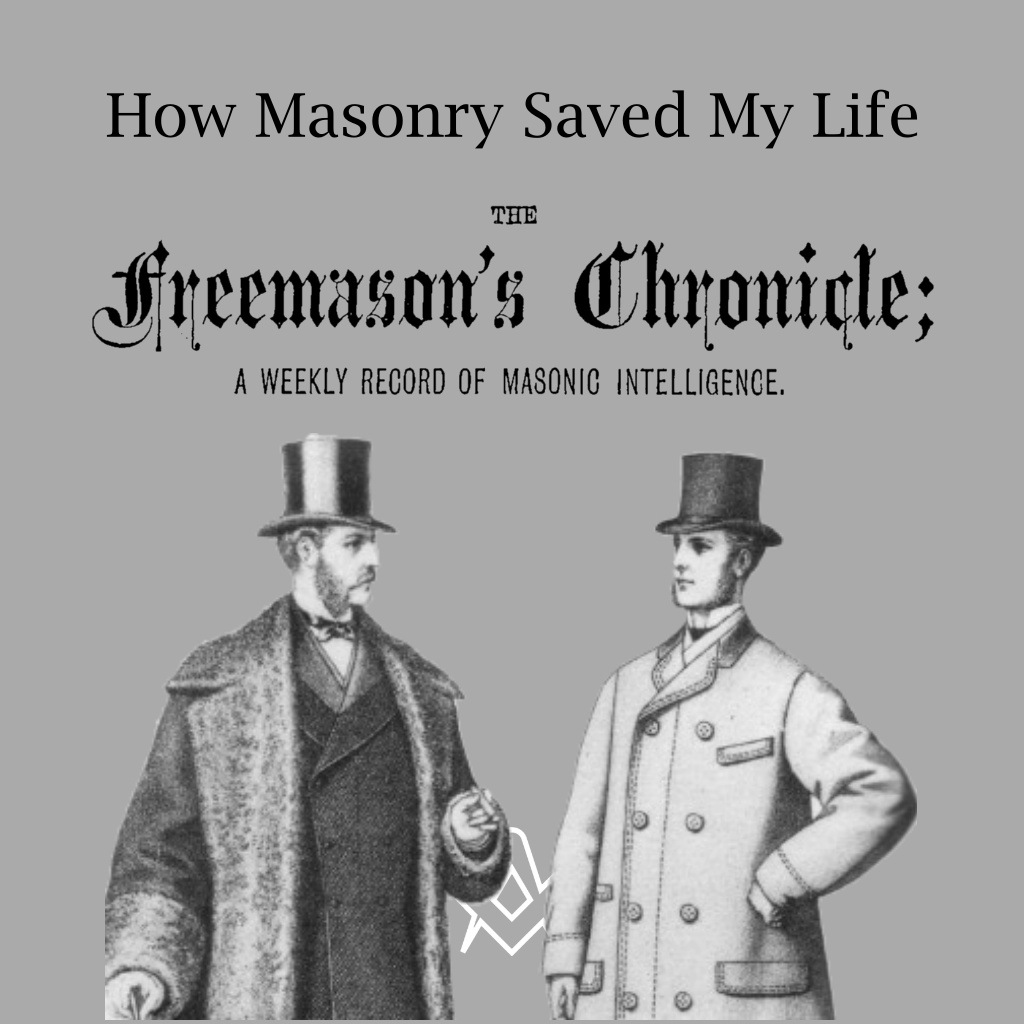Uncover the incredible story of how Masonry saved the life of a Crimean War foot soldier in this historical and masonic account. Through the first hand experience of a soldier engaged in fierce hand-to-hand combat, witness the fateful encounter with a Russian Freemason that changed the course of his life. Learn how brotherhood and a deep dedication to the craft can lead to unforeseen and life-saving circumstances on the battlefield.
The Freemason’s Chronicle – 23 October 1875
I became a Mason before I obtained my majority in the — regiment of foot. I joined a celebrated Lodge in the Metropolis, and although at first, I took but a languid interest in the business, I soon became interested, and endeavoured to make myself familiar with the teaching-a of the order.
My regiment was at this time stationed at Chatham, but I always contrived to run up to town to attend Lodge, and I usually found the Masonic banquets much more enjoyable than the mess dinners.
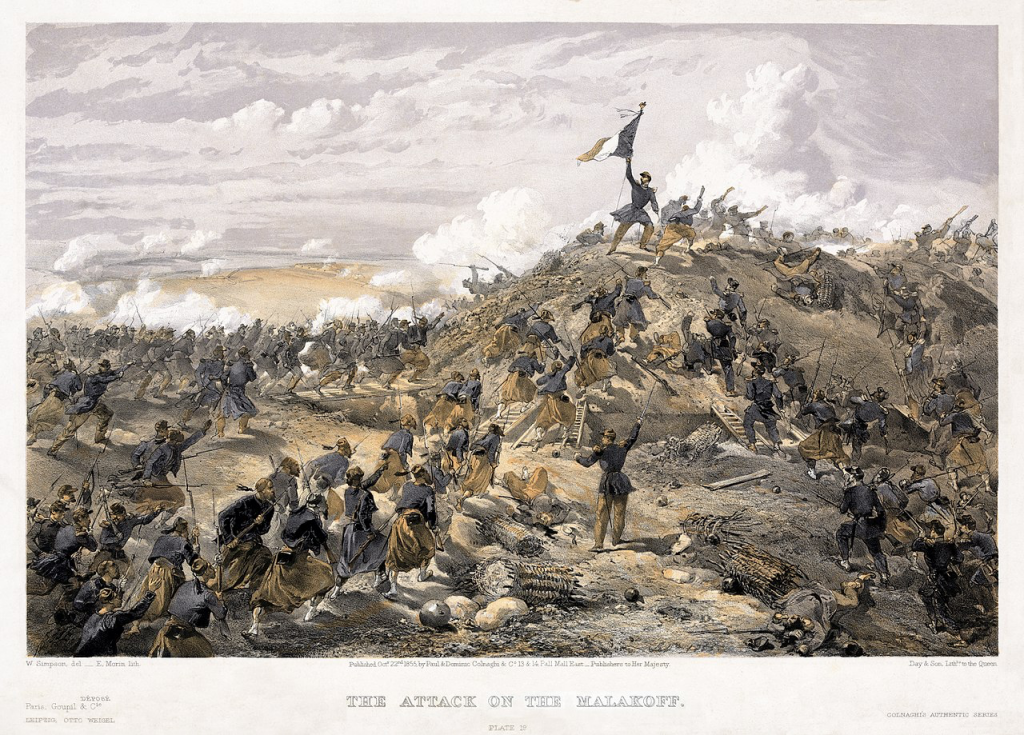
The Attack on the Malakoff by William Simpson.
[Editor’s note The Crimean War was fought from October 1853 to February 1856 between Russia and an ultimately victorious alliance of the Ottoman Empire, France, the United Kingdom and Sardinia-Piedmont. ]
I had taken two or three degrees in the Order, and was looking forward in due time, to fill some honourable office in the Lodge, when war broke out between England and Russia.
We had been expecting hostilities, and immediately upon the publication of the Queen’s proclamation my regiment received orders to hold itself in readiness for active service. I had at once to give up all my dreams of Masonic advancement, and prepare myself for the stern duties of the field.
My readers will doubtless remember the stirring incidents of the period of which I am writing, and I need not dwell upon the details connected with our departure for the Crimea.
We were among the first troops to embark, and, with our luggage, we were crowded into one of those uncomfortable troop ships of the urgent type, which were the best means of transport our Admiralty then possessed. The magnificent Jumna and Serapis, with their sister consorts, were not then in existence.
Some of the regiments were embarked on board of hired transports, and others were accommodated on board the line of battle ships, which formed a portion of the fleet which was to attack the forts of Sebastopol. The voyage was an unpleasant one, but we did not mind that.
Our fellows were delighted at the thought of active service in the field, and no one dreamed of the hardships and sufferings which we were fated to endure. Our landing at Eupatoria, and the victory of the Alma, are facts of history too well known to need any reference here.
We were in the hottest of the fire at the Alma, and our men behaved splendidly. We had many raw recruits in our ranks, but they bore themselves on this memorable clay like seasoned soldiers, and gallantly upheld the traditional fame of the old —th.
Some of us were sanguine enough to believe that this victory had decided the fate of the Russians-, but we soon discovered that our task was only beginning.
When the trenches were opened, we were among the troops ordered to the front, and from first to last we got more than our share of the fighting. We should not, however, have minded that if we had been properly cared for.
We were a fortnight without tents, and when we got them, they were a poor defence against the weather; mere rags in fact, which admitted every breadth of wind.
I, and two or three of the officers messed and slept together in a small tent, to the right of our position, and we soon found that the mess was a mere fiction.
Hard bread and salt junk, with green coffee, were indeed served out to us, but we had no comforts, and our private stores, upon which we had based our hopes, were safe on board our ship in Balaclava harbour, and we had no chance of getting them.
Often have I, after spending a night on the damp ground, with no other shelter than our flimsy tent and a blanket, risen to breakfast off biscuits and cold water.
The men of course were no better off than ourselves, and as winter approached a great many of them were obliged to cut up their knapsacks into leggings, to defend their limbs from the wet and mud of the trenches.
What awful nights those were which we spent on duty at the front! We did not care about the enemy; an occasional sortie from the garrison was welcomed as a relief from the dreary monotony of our watch. The excitement revived us, and the danger was as exhilarating as wine.
A brush with the enemy, at the point of the bayonet, was a trifle, but to stand under arms for hours at a time, up to the knees in mud, this was a trial to test the powers of the strongest.
After a night spent in this manner we frequently marched to the rear, to find that there was nothing for us to eat. Foraging was out of the question.
The troops in the rear managed occasionally to pick up a day’s rations m this way, but there was no such luck for our fellows.
Salt junk, or salt horse, as the sailors call it, was beginning to tell upon us, and our mess at least was suffering from that indescribable longing for fresh meat, which must be felt to be understood.
The regiment which was quartered near us was French, and the men possessed a brute of a dog, which somehow or other managed to keep a little flesh on his bones, we longed to shoot and dine off the rascal, which was constantly prowling about our tent, but honour forbade us to attempt such an outrage.
” Gaston ” was known to be a great thief, and we strongly suspected that he made free with our scanty rations; but we could never catch him in the act, until one memorable night the rogue, forgetting his usual caution, slipped into our tent, and snatched a piece of pork before our very eyes.
O’Flannigan of ours had been cleaning his revolver, and as the brute rushed past, with the meat, he struck him a tremendous blow on the head with the but end of the weapon.
Poor Gaston rolled over, with a cry which was across between a howl and a shriek, dropped the meat, turned up the whites of his eyes, and gave up the ghost. We were not long in disposing of the body, and I must confess that roast dog is an excellent dish.
I wonder our lively neighbours who have added horseflesh to the dietary of man do not think of the canine race. I might perhaps at the present time prefer a mutton cutlet to a broiled puppy, but when we were starving on salt junk and sea bread anything in the way of a fresh bite was a luxury.
We had to pay for Gaston though through the nose. His comrades in the regiment soon cleared up the mystery of his disappearance, and O’Flannigan and I had to exchange shots with a couple of fire eaters, who felt bound in honour to burn powder over the affair.
But this little incident keeps me from the pith of my story.
I have to tell how Masonry saved my life, and I hasten at once to the denouement.
Our lines had been steadily pushed forward towards the Russian batteries, and we were almost every day expecting a sortie, when, one evening, as I was looking over the earthen parapet in the direction of the battery, which had been playing upon us all day, I thought I saw a dark and moving mass advancing upon our left.
I hinted my suspicions to Major L— , and we both watched carefully. Presently we saw the glitter of steel.
“That was the sword of an officer,” said L—-, ” the fool has been using the flat of it upon the back of a laggard.
I am satisfied now that a large force is advancing upon us.” A few minutes sufficed to make our few preparations to receive the enemy, and we awaited the attack in sullen silence.
The moment the head of the attacking column was plainly visible, we commenced playing upon it with grape and canister.
The Russians rushed forward with a loud shout, and we replied with a volley of musketry. The enemy was truly in great force, and had soon reached the parapet of our works, when a desperate attack, on our part, with the bayonet, drove him back in great confusion.
We rushed out of the trenches, and a hand-to-hand conflict took place in the darkness the like of which I have never seen since, and hope I shall never see again.
The Russians were ably supported by reinforcements from the rear, and we were assisted by a brigade of French Infantry which came up as soon as the firing was heard.
We had driven the enemy to the counter scarp of his own works, when he rallied, and made a desperate charge, under which our men reeled and retreated for a moment. In the struggle I received a bayonet wound in the side, and fell.
A fresh column of Russians had come out to relieve their comrades, and these fellows covered the retreat in a most masterly style.
I expected every moment to receive the coup de grace, for the retreating Russians cruelly bayoneted our wounded as they lay helpless on the ground. A brute of a fellow had, indeed, brought his bayonet to the charge, with the intention of finishing one, when, with a sudden inspiration, I sprang to my feet, seized the hand of an officer who stood near, and gave him the sign.
Fortunately he was a Mason, he of course instantly returned it, while, with his sabre, he thrust back the deadly point which was levelled at my breast.
My brotherly foe immediately gave an order for my removal, and I was carried into the shelter of the battery by the very men who, but for my happy thought, would have given me a happy despatch to the other world.
My wound was instantly attended to, and the next morning I received a visit from my preserver, who brought with him a surgeon, who soon made me as comfortable as circumstances would admit.
The story of my miraculous escape soon spread through the division, and I received many kind visits from Masons, who proved themselves to be brothers in word and deed.
Many little comforts were contributed by these good fellows, with the view of making my captivity as pleasant as possible. I was of course hors-de-combat for the remainder of the campaign.
I was taken into the interior as soon as I could be moved, but my story went with me, and I everywhere received the kindest treatment from the Russian officers.
My captivity was not a very long duration, and I need not dwell upon the subsequent events of the war. The death of the Czar hastened the peace, and I was among the first of the prisoners who returned to England.
I need scarcely add that I have ever since been a most zealous Mason, and shall cherish the principles of the Order as long as I live.
When I hear people railing against Masonry, or when captious critics demand to know what practical good the Order has achieved, I usually tell my story, and I am tempted to relate it once again in the enduring form of letter-press, in the hope that the moral of the incident may compel conviction in the minds of those who are too ready to believe that Masonry is merely humbug in disguise.
DAG
 The Freemasons Chronicle, a weekly record of masonic intelligence, was first published 2nd January 1875 London, England as an independent weekly journal of masonic interest and continued for 27 years.
The Freemasons Chronicle, a weekly record of masonic intelligence, was first published 2nd January 1875 London, England as an independent weekly journal of masonic interest and continued for 27 years.
It should be the business of a journal devoted to the interests of the Order to attempt the removal of prejudices such as these, which, though they may have little perceptible influence upon the prosperity of the Fraternity, yet have the effect of preventing timid or ill-informed persons from enlisting under its banner.
It will not only attempt to keep pace with the growing literary requirements of the day, but it will seek to exhibit the Order to the non-Masonic world divested of its technical details, and clothed in the garb of Charity and Brotherly Love.
The questions of the hour, which exercise the minds of thoughtful men, will be handled freely and broadly, without any tinge of political or sectarian bias.
The memoranda of Masonic gatherings which will appear from week to week, will be full and accurate; and as free interchange of opinion is one of the best signs of life and vigour in any society, ample scope will be given for Correspondence on topics of interest to the Order.
If we may venture upon a new rendering of words which recent events have made memorable, we will say here, once and for all, that we will be keen men of business, and will spare no effort, consistent with honour, to achieve commercial success; but first, and before all things, we will prove to our brethren and the world that we are FREEMASONS.
Recent Articles: The Freemason's Chronicle
 Operative And Speculative Masonry Explore the fascinating transition from Operative to Speculative Masonry in our latest post. Discover historical insights from Augustus C. L. Arnold and Rev. Wm. P. Strickland, shedding light on Freemasonry's evolution and its enduring principles. Dive into the rich history and significant milestones that shaped modern Freemasonry. - The Freemason's Chronicle - 2 September 1876 |
 Discover the true essence of Freemasonry, an ancient order founded on the profound principles of love for God and man. It's a call to rise above mere appearances, to embody genuine virtue and benevolence, transcending societal pretense. Embrace the transformative power of simplicity, and let the authentic glories of Freemasonry inspire your path. |
 Discover the intriguing story of a man who became a Mason but openly professed his dislike for the institution. Unravel the peculiar circumstances that led him down this path and explore the unexpected consequences that followed. Dive into this thought-provoking account that challenges our notions of loyalty and reveals the complexities of human nature within the Masonic fraternity. |
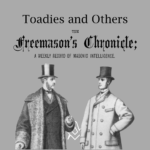 In the realm of Masonry, the principles of equality and respect are paramount. Yet, the presence of toadies—those who obsequiously seek favour from the influential—threatens these ideals. While Masonry embraces diverse beliefs and backgrounds, it rejects the sycophantic behaviours of toadies, flunkeys, and tuft-hunters, urging members to uphold genuine respect and self-worth. The Freemason's Chronicle - 22nd January 1876 |
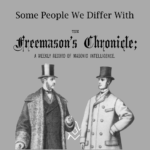 Unveiling the Unpleasant: Some People We Differ With Discover the intriguing dynamics of quarrels within the Masonic brotherhood. From the cantankerous to the litigious, the peevish to the vengeful, delve into the characters that challenge fraternal harmony. Explore their motives, temperaments, and the art of navigating disputes with these fascinating brethren. Brace yourself for a riveting journey into the world of conflicting personalities. |
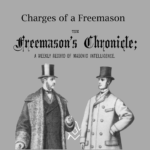 Unravelling the Masonic Mystique: A Deep Dive into the Freemasons' Charges - Explore the intricate world of Freemasonry, its principles, rituals, and the mechanisms for resolving internal disputes. Discover how this ancient fraternity fosters unity, promotes moral conduct, and upholds the sanctity of its secrets, while navigating the complexities of modern society. - The Freemason's Chronicle - 4 December 1875 |
 Unlock the hidden lessons of Masonic Studies! Don't settle for superficial knowledge or mere rituals. Discover the true depth and meaning behind Freemasonry. Expand your understanding of Tracing-Boards, Lectures, and more. Join regular Lodges of Instruction to enhance your Masonic journey. Become a knowledgeable Freemason, not just a token-bearer. Unleash the power of true Masonic wisdom today! |
 Uncover the incredible story of how Masonry saved the life of a Crimean War foot soldier in this historical and masonic account. Through the first hand experience of a soldier engaged in fierce hand-to-hand combat, witness the fateful encounter with a Russian Freemason that changed the course of his life. Learn how brotherhood and a deep dedication to the craft can lead to unforeseen and life-saving circumstances on the battlefield. |
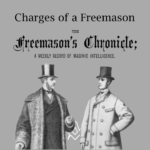 The Freemason's Chronicle - Charges of a Freemason The secrets of Masonry are the exclusive property of the Craft, and can never be communicated to one who is a mere labourer and not an accepted Mason. Hence, no labourer, that is, one who has not been regularly initiated in a legal Lodge. Article first published in The Freemason's Chronicle, 27 November 1875 |
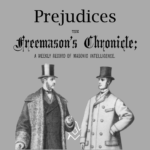 The Freemason's Chronicle - Prejudices Prejudices are partial judgments in favour of, or against certain persons or things, and, for convenience sake, may be ranged in two categories—those which are, comparatively speaking, harmless, and those which are harmful. Article first published in The Freemason's Chronicle, Oct. 2 1875. |
 The Freemason's Chronicle - Cliques Is Freemasonry - a Clique ? Man has been defined as a gregarious animal, but in his highly civilised condition he is gregarious only to a limited extent. First published in The Freemason's Chronicle, Oct. 2 1875, addresses the same challenges then as now. |
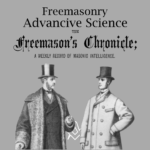 The Freemason's Chronicle - Freemasonry - an Advancive Science Is Freemasonry - an Advancive Science ? Not to confuse advancement with innovation. Has it been the case that Freemasonry's survival for 300 years plus is due to being an Advancive Science, tending to advance. First published in The Freemason's Chronicle 18 September 1875, addresses the same challenges then as now. |
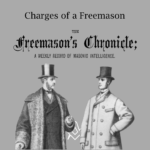 The Freemason's Chronicle - Charges Of A Freemason An interpretation of the "Charges of a Freemason", written Bro. Cornelius Moore and published in 1875, that introduce certain opinions that for some readers, will not sit well in contemporary times. - The Freemason's Chronicle, Sept. 11, 1875 |
 On The Order Of The Temple And Its Doctrine. THE Order of the Temple is divided into two great classes, denominated respectively the Order of the Temple and the Eastern Order. The Eastern Order gave birth to the Order of the Temple, and in the course of time has become an appendage of the latter. It is in ancient Egypt that we find the cradle of the Eastern Order. The Freemason's Chronicle, Sept. 4, 1875 |
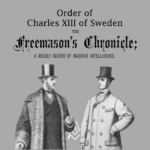 Order of Charles XIII of Sweden The following translation of the Manifesto of King JL Charles XIII of Sweden, on the occasion of his establishing the Masonic Order which bears his name, and of the Statutes of the said Order, may be interesting to our readers. The Freemason's Chronicle, Aug. 28, 1875 |
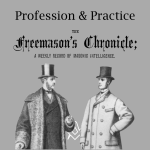 Most of our readers in the course of their experience, have doubtless met with enthusiastic brethren who take it for granted that a Mason can do no wrong. These enthusiasts are thoroughly convinced that the vast majority of those who join the Order are the most benevolent, the most moral, and the very noblest members of society. - The Freemason's Chronicle 10 July 1875 |
 An article investigating the relationship between masonry and citizenship. Are the principles of Freemasonry aligned with the freemason's claim to be a better citizen of the world? The Freemason's Chronicle - 19 June 1875 |
 A visitor must make clear his identity to the satisfaction of the Lodge he proposes to visit. More than once have we been asked to explain our views as to the reception of strangers in a Lodge. - The Freemason's Chronicle - 29 May 1875 |
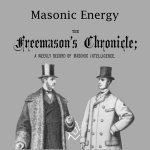 Is there reason in the accusation that Masonic energy looks only to a course of good feeds, when we can point to such grand results as have been achieved in these latter years, both in respect of the extension of our Order ? - 1May 1875 |
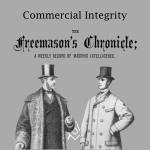 Implementing Freemasonry's peculiar system of morality in our day to day business affairs was the topic of this article, Commercial Integrity, first published in The Freemason's Chronicle - 8 May 1875 |
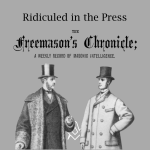 Ridicule has been somewhat illogically described as the test of truth. If it were so, Freemasonry ought to have perished long since. Two press reports from May 1875 covering the |
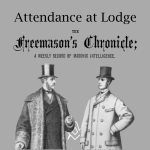 There are many things which Freemasonry will do for a man in the way of opening his mind and giving him larger and kindlier views of life, but Freemasonry itself, cannot eradicate the natural bias of the disposition. |
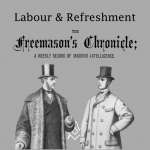 There is, we fear, too marked a tendency in very many Lodges to hasten through its labours, with a view to entering, as soon as possible, upon the business of refreshment. - The Freemason's Chronicle 17th April, 1875 |
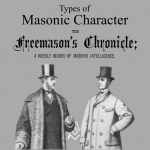 Another example that demonstrates that nothing really changes in Freemasonry. In an article the Types of Masonic Character published 145 years ago in The Freemason's Chronicle 10th April, 1875 |
 A brief history on the relationship between the British Monarchy and the craft - The Freemason's Chronicle 20th March , 1875 |
 What are the qualities of a convivial man and how does this dovetail perfectly in to Freemasonry ? 16th March, 1875 |
 A review of the "Sketch for the History of the Dionysian Artificers," a fragment, by Hyppoli to Joseph Da Costa - This little work may be regarded as, so to speak, the Holy Grail of Masonry. |
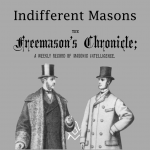 Nothing really changes, an article Indifferent Masons, From Le Monde Maçonnique 1874. Translation published in The Freemason's Chronicle 20th February, 1875 |
 In handling an intruder in the lodge, we endeavoured to show that a good Mason should be a gentleman, and a sincere man. The Freemason's Chronicle 20th February, 1875 |
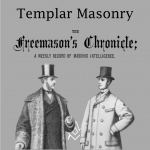 Templar Masonry - a historical aspect of the Religious and Military Order of the Temple published in The Freemason's Chronicle 13th February, 1875 |
 Secrecy perhaps the strongest objection urged by the enemies of the Masonic Order against its existence published in The Freemason's Chronicle 20th March 1875 |
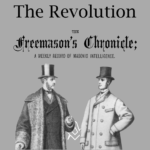 Freemasonry In The United States during And After The Revolution We take a look at Freemasonry in the United States during and after the Revolution first published in The Freemason's Chronicle - February 6, 1875 |
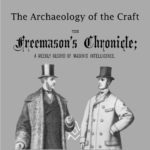 We take a look at the archaeological connection with the Craft, first published in The Freemason's Chronicle - January 30, 1875 |
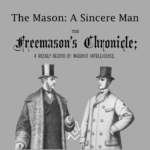 What it means to a Freemason to be a sincere man. Extract: first published in The Freemason's Chronicle - January 23, 1875 |
 What it means to a Freemason to be a citizen of the world ? First published in The Freemason's Chronicle - January 16, 1875 |
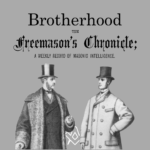 Brotherhood! In that one word what sympathetic associations arise. First published in The Freemason's Chronicle - January 9, 1875 |
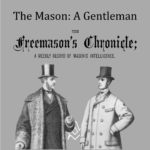 This opening article was written 145 years ago, yet it resonates with Freemasons today as it did then. First published in The Freemason's Chronicle, January 2, 1875, Issue 1 |
masonic knowledge
to be a better citizen of the world
share the square with two brothers

click image to open email app on mobile device



